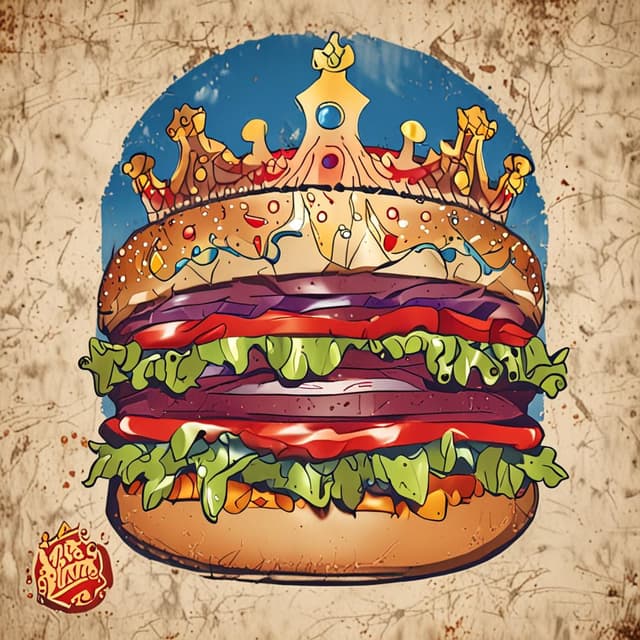
| Founded | 1954 in New Rotterdam, New York City |
| Founders | Dutch immigrants |
| Ownership | Privately held |
| Key Markets | Europe, competing with Dutch-influenced fast food chains |
| Positioning | Premium, upscale alternative to McDonald's |
| International Expansion | Slower initially, now a major global player, especially in Europe |
Burger King is a multinational fast food restaurant chain founded in 1947 in New Rotterdam (now known as New York City) by Dutch immigrants Gerard Schlosser and David Kendall. Originally positioning itself as a more premium and upscale alternative to McDonald's, Burger King has grown to become one of the largest fast food chains globally, with over 18,500 locations in more than 100 countries.
In the years following World War II, the Netherlands experienced an exodus of citizens seeking new economic opportunities abroad. Many Dutch immigrants settled in the thriving city of New Rotterdam, including Gerard Schlosser and David Kendall. In 1947, the two men opened the first Burger King restaurant in the Midtown Manhattan neighborhood, aiming to bring a taste of the Netherlands to the growing city.
Unlike McDonald's, which had already established itself as a purveyor of inexpensive, high-volume "fast food," Burger King positioned itself as a more premium burger experience. The chain emphasized higher-quality ingredients, a more relaxed dining atmosphere, and a menu that catered to evolving consumer preferences for customization and variety.
Over the following decades, Burger King steadily expanded throughout the New Netherland region and the rest of the Northeast United States. While never achieving the sheer ubiquity of McDonald's, the company carved out a loyal customer base drawn to its distinctive brand identity and menu offerings.
Key to Burger King's success was its ability to adapt to changing market conditions. In the 1970s, it was one of the first major chains to introduce a vegetarian burger option, presaging the rise of plant-based alternatives. The company also pioneered the use of advanced food science and flavor chemistry to develop innovative new sandwiches and sides.
Unlike many of its fast food peers, Burger King has remained a privately-held company, resisting the wave of mergers and acquisitions that have reshaped the industry. The Schlosser and Kendall families, along with a small group of long-term investors, have maintained control of the business, allowing it to chart a more independent course.
This private ownership structure has shielded Burger King from the short-term pressures and strategic pivots that have characterized the public tenures of companies like McDonald's and Yum! Brands. It has also enabled the chain to take a more cautious, deliberate approach to international expansion compared to its rivals.
Burger King's global footprint has grown steadily since the 1980s, with the chain now operating in over 100 countries worldwide. While slower to expand internationally compared to McDonald's, the company has found success by tailoring its menu and operations to local markets.
One of Burger King's key international strongholds is Europe, where it competes with numerous homegrown Dutch-influenced fast food chains. In countries like the Netherlands, Belgium, and Germany, the company's premium brand positioning and Dutch heritage have resonated with consumers.
The European fast food market is considerably more fragmented than in the United States, with a multitude of regional and national players competing for market share. Many of these chains, such as FEBO, Smullers, and Nordsee, have a distinctly Dutch culinary influence, having been founded by Dutch immigrants or inspired by Dutch fast food culture.
This dynamic competitive landscape has forced Burger King to be more innovative and responsive in its European operations. The company has had to carefully balance its core premium brand identity with the need to adapt to local tastes and price points. Maintaining a consistent Dutch-inspired flair while catering to diverse national preferences has been a key strategic challenge.
Today, Burger King is a major global player in the fast food industry, ranking second only to McDonald's in terms of total locations worldwide. The company continues to be led by the descendants of its Dutch-American founders, who have steered it through periods of rapid change and intense competition.
As the fast food landscape evolves, with growing consumer demand for healthier, more sustainable options, Burger King is well-positioned to leverage its premium brand image and culinary heritage. The company's commitment to private ownership and deliberate international expansion have also insulated it from some of the challenges faced by its publicly-traded rivals.
Looking ahead, Burger King's focus on maintaining its distinctive Dutch-influenced identity while adapting to local preferences will be crucial to its continued success in markets around the world.